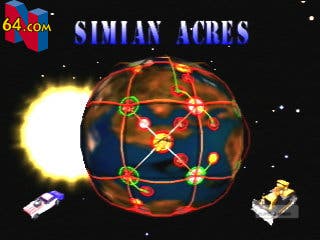Retrospective: Blast Corps
Dozy blastard.
The other cursed name, Diamond Sands, was, on first inspection, a much simpler experience. "Oh, this?" the game said. "This is just a load of terraced houses down a central track. Nah, this is fine, just make sure you get them all and you're set." Ah, superb, a relaxing smash-fest. Wait, which vehicle do I get to use, game? "Hmm? Oh, just hrfhrf..." Pardon? "I said Backlash."
Backlash. Backlash! Bloody Backlash. A dump truck with delusions of grandeur, Backlash couldn't fly, or roll, or even spit acid. Backlash could wiggle a bit and then sort of spin sideways, if he felt like it. Wilfully denying of the laws of physics, hitting a house front on with Backlash wouldn't make a dent; manage to wrestle the controller hard enough to actually swing his rear end out, though, and structures were crumbling in seconds. The problem was with the game's camera: disobedient at best, I'm positive it actively flipped you off when you turned around. Diamond Sands revolved around a central artery, a track on which all offending obstacles were based. To clear the stage, the camera had to be constantly set, reset, and re-reset, while the truck itself comprehensively refused to slip into its signature tailspin.
But yet, despite these whimper-inducing trials of mental strength, to me and countless other N64 stalwarts, Blast Corps is still viewed through spectacles of the rosiest tint. The incredibly high rosieosity score (measured on my useful rosiemeter) can be explained by reference to Clint Hocking's statement, made like some reverse-Nostradamus 10 years later, that mastery of a game-world ruins the entire experience.

Blast Corps toes the line between two opposing absolutes. Exhibit A, the single-button city-annihilation levels, can only co-exist in a perfect playing experience with Exhibit B, the twisted, mental and ergonomic gymnastics required to best the Oyster Harbours and Diamond Sands of the game. The two elements are diametric opposites, but exist in a symbiotic relationship, ensuring that while the N64's other classics - the GoldenEyes, the Marios, the Zeldas - have all arguably had their respective genres headed by newer titles and lost a level of their relevance, Blast Corps remains one of the most compelling releases to have ever graced the console.
Time with the game is simultaneously punishing and rewarding. Hocking's concept of mastery, teased by some levels as an attainable goal, is quickly snatched away from the player. It's this desire to bend the game to your will as a player that drives us on, determined to beat the artificial constructs put in place by developers. Rare clearly understood that it had created a game with a powerful underlying compulsion - like a set of proto-Achievements, completion of levels within a certain time yielded rewards. As a form of cruel joke, the game is seeded with platinum medals, speedruns completed by the most overworked games testers on the project. Beating these is nigh-on impossible, but in today's Trophy/Gamerscore-obsessed climate, I'd say these records would last a week. Nintendo, bring Blast Corps to the Virtual Console, and let's find out.